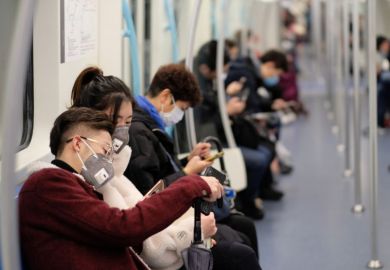The Trump administration’s waiver of online course rules to help US colleges cope with the coronavirus outbreak does not appear to cover foreign students, risking public health broadly, Northeastern University has warned.
An initial group of universities, including Stanford University and the University of Washington, announced last week that they were cancelling in-person classes and using online alternatives for at least short periods owing to concerns about the spreading virus.
Both Stanford and Washington took the actions after each had a staff member test positive for the Covid-19 strain, and after the Trump administration said it would let institutions temporarily teach in online formats without obtaining formal approvals.
Northeastern is also moving its Seattle campus temporarily to online instruction, but protested the Trump administration’s failure to include foreign students in the waiver. Northeastern is based in Boston, and most of its 700 students in Seattle – the US city hit hardest so far by Covid-19 – are foreigners.
Giving all students an online option is “manifestly in the public interest as community spread of Covid-19 widens across the United States”, Northeastern’s president, Joseph Aoun, said in a letter to Chad Wolf, acting secretary of the US Department of Homeland Security.
“Students should not be put in the difficult position of risking their health or jeopardising their education,” Professor Aoun told Mr Wolf.
Foreign students in the US risk deportation if they do not comply with the terms of their visas, which require in-person course instruction, with limits on online alternatives.
A spokeswoman for the US Education Department, which announced the waiver of online rules, said she had no immediate comment on the matter.
The University of Washington’s decision covers some 50,000 students at all three of its campuses, in Seattle, Tacoma and Bothell. Classes and finals will not be held in person for the remainder of the winter quarter, which ends on 20 March, the institution said. The university said it expected to resume normal class operations on 30 March with the start of the spring quarter, “pending public health guidance”.
Stanford’s decision covers its 16,500 students for the final two weeks of its current quarter. More than 3,000 Stanford students had signed a petition circulating during the week calling for online options.
Class closures have become widespread at colleges globally, and have begun spreading at the school level in the US, as the worldwide toll of Covid-19 has risen past 100,000 infections and 3,600 deaths.
Many US colleges have been cancelling travel programmes, and several academic groups have cancelled meetings. They include the American Council on Education, the main US higher education lobby group, which announced the cancellation of its annual conference this coming weekend in San Diego. ACE said in a statement that it had been implementing steps to keep the meeting safe for its 1,500 attendees. “But events have overtaken ACE2020 and much of higher education,” it said. New York University’s Langone Medical Center has ordered a 60-day ban on all staff travel.
US colleges and universities host nearly 370,000 students from China, the top provider of students globally, and the country where Covid-19 originated and that accounts for the most cases.
A survey covering 234 US institutions from 43 states, conducted by the Institute of International Education, found that 37 per cent of them had at least some students prevented from returning to the US after the holiday season by virus-related travel restrictions.
Nearly half the institutions have offered the students options for remote study, and about two-fifths have offered them leaves of absence or deferment, said the IIE, which promotes international student exchange. Nine per cent of the institutions said they’ve issued refunds, IIE reported.
For Asian students remaining in the US, problems have included racist reactions based on the origin of Covid-19. The University of California, Berkeley, with more than 30 per cent of its students of Asian descent, apologised after its health services posted an advisory that included “xenophobia” among the “normal” reactions to the virus.
Register to continue
Why register?
- Registration is free and only takes a moment
- Once registered, you can read 3 articles a month
- Sign up for our newsletter
Subscribe
Or subscribe for unlimited access to:
- Unlimited access to news, views, insights & reviews
- Digital editions
- Digital access to THE’s university and college rankings analysis
Already registered or a current subscriber?



